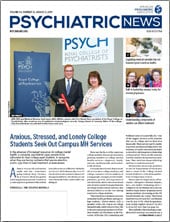We can answer that question in a word: hope.
The psychiatrists and clinicians who come back to IPS year after year have several common goals: A hope that we can perfect our skills to help those with mental illness; a hope that we can help more people access needed treatment; and a hope that by providing care to a community, we can make the world a better place. This year’s IPS will be held in New York City from October 3 to 6.
We have long sought answers to a question that should have been put to rest decades ago: How do those with the fewest resources navigate a deficient mental health system and obtain needed treatment when discrimination is so firmly embedded in our history? Those of us invested in IPS—the community psychiatrists on the front lines battling mental illness—focus on helping those who are most in need. This unending and often overwhelming effort, however, requires resources that are beyond any one of our individual abilities; and it is imperative that now, more than ever, we build and lead multidisciplinary teams and support each other in this difficult but rewarding work we do.
Social workers, psychologists, nurse practitioners, and care managers often have the expertise to address the complex needs of our patients. Pathways for patients to get medications, therapy, and other interventions are crucial, and psychiatrists typically work with our fellow professionals to reach our common goal—helping those with mental illness. This year at IPS we are focusing on bridging what may seem like a divide among our colleagues in an effort to stand together, learn from each other, and turn the spotlight toward creating a system of treatments that most help our patients. By creating a conference tailored to multidisciplinary collaboration, we are hoping to provide an environment that will encourage the most rewarding experience for each of our attendees.
Many of our members have focused their careers on obtaining specialty training, further enhancing our abilities to offer sophisticated and knowledgeable treatments. Community psychiatry and addiction psychiatry provide the foundation on which IPS is built. In this year’s program, you will see these subspecialties represented in many sessions. You will also see a continued focus on diversity and health equity in presentations that will further our knowledge on addressing injustices in our systems of care. Diversity has become a hallmark of APA and IPS, making our organization stronger.
Our medical students, residents, fellows, and early career psychiatrists who attend the IPS represent the future of our organization. Our program continues to tailor sessions dedicated to their well-being, and many of our trainees have presentations and posters to educate us on subjects about which they are passionate. Psychiatrists who attend IPS mentor and sponsor these trainees, and we hope this collaboration continues as IPS provides the most intimate setting to bridge the different generations in our profession.
Lastly, we are trying to learn ways to continue to strengthen IPS by tailoring the conference to your educational and networking needs. We need your presence, your voice, and your ideas to help IPS grow into a conference that will be sustainable for many years to come. As we noted at the beginning of this article, the core of IPS is hope. We have heard it in the presentations you have given over the years, and we see it in the faces of our attendees when they commune with colleagues and old friends.
Each of us, like our patients, benefit from a sense of community and belonging. We believe this year’s IPS in New York City will again provide that for the attendees. We hope to see you in New York. ■
Register for IPS now at the low advance registration rates
here. Resident-fellow members can register for only $100.

